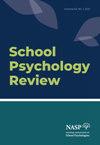Integrating Intersectionality, Social Determinants of Health, and Healing: A New Training Framework for School-Based Mental Health
IF 3
3区 心理学
Q1 Social Sciences
引用次数: 5
Abstract
Abstract Social justice-centered training has progressed in school psychology, yet training and practice still do not adequately address systems-level influences on mental health, let alone focus on dismantling the systemic inequities that adversely affect the wellbeing of marginalized children and youth. An equity- and intersectional justice-minded framework for training future school psychologists in school-based mental health is presented, informed by the theories of intersectionality, critical race theory, social determinants of health, and radical healing. The proposed framework is based on reflective practice and incorporates three pillars that emphasize the importance of decentralizing psychodiagnostic assessment, centralizing systems-level work, and renewing focus on strengths and healing. To advance training that critically evaluates social factors that affect child wellbeing while honoring children’s identities and strengths, various ways in which graduate programs can enact this paradigm shift are discussed. Future directions for the field, including research and policy, are also presented. Impact Statement This article offers a framework to train school psychologists on how to intervene at the systems and societal levels to promote equity in child mental health. The first pillar emphasizes the need to decentralize psychodiagnostic assessment in school psychology practice—in order to move away from predominantly reactive, deficit-focused assessment activities that perpetuate inequities and to carve out more time for prevention of mental health difficulties and promotion of wellness. The second pillar centralizes systems-level work, particularly through additional training in MTSS, systems-level consultation to build capacity and develop novel initiatives to address social determinants of mental health, and advocacy and policy work. The third pillar involves training with a renewed focus on strengths, as helping marginalized children resist and heal from oppression requires reversing entrenched tendencies to pathologize, and building on individual, familial, and cultural strengths to foster wellbeing.整合交叉性、健康的社会决定因素和治疗:一个新的校本心理健康培训框架
摘要以社会正义为中心的培训在学校心理学方面取得了进展,但培训和实践仍然没有充分解决系统层面对心理健康的影响,更不用说专注于消除对边缘化儿童和青年福祉产生不利影响的系统性不平等了。在交叉性理论、批判性种族理论、健康的社会决定因素和彻底治愈的基础上,提出了一个公平和交叉正义的框架,用于培训未来的学校心理学家进行校本心理健康培训。拟议的框架以反思性实践为基础,包含三大支柱,强调分散精神诊断评估、集中系统级工作以及重新关注力量和治愈的重要性。为了推进批判性评估影响儿童福祉的社会因素的培训,同时尊重儿童的身份和优势,讨论了研究生项目实现这种范式转变的各种方式。还介绍了该领域的未来方向,包括研究和政策。影响声明本文提供了一个框架,培训学校心理学家如何在系统和社会层面进行干预,以促进儿童心理健康的公平。第一个支柱强调了在学校心理学实践中分散心理诊断评估的必要性,以摆脱主要是被动的、以缺陷为重点的、使不公平现象长期存在的评估活动,并为预防心理健康困难和促进健康腾出更多时间。第二个支柱集中在系统层面的工作,特别是通过MTSS的额外培训、系统层面的咨询以建设能力和制定新的举措来解决心理健康的社会决定因素,以及宣传和政策工作。第三个支柱涉及重新关注力量的培训,因为帮助边缘化儿童抵抗压迫并从压迫中康复需要扭转根深蒂固的病态倾向,并在个人、家庭和文化力量的基础上培养幸福感。
本文章由计算机程序翻译,如有差异,请以英文原文为准。
求助全文
约1分钟内获得全文
求助全文
来源期刊

School Psychology Review
Social Sciences-Education
CiteScore
6.90
自引率
20.00%
发文量
54
期刊介绍:
School Psychology Review (SPR) is a refereed journal published quarterly by NASP. Its primary purpose is to provide a means for communicating scholarly advances in research, training, and practice related to psychology and education, and specifically to school psychology. Of particular interest are articles presenting original, data-based research that can contribute to the development of innovative intervention and prevention strategies and the evaluation of these approaches. SPR presents important conceptual developments and empirical findings from a wide range of disciplines (e.g., educational, child clinical, pediatric, community.
 求助内容:
求助内容: 应助结果提醒方式:
应助结果提醒方式:


